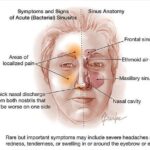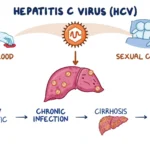Acute hepatic failure, also known as fulminant hepatic failure, is a rapid loss of liver function, often occurring within days or weeks in individuals without pre-existing liver disease. This condition is life-threatening and requires immediate medical intervention. Early recognition and treatment are crucial to improving patient outcomes.
Pathophysiology
Acute hepatic failure occurs when extensive liver cell damage leads to the impairment of metabolic and synthetic functions. The inability to clear toxins results in hepatic encephalopathy, coagulopathy, and multi-organ dysfunction.
Causes of Acute Hepatic Failure
Several factors can contribute to acute hepatic failure, including:
- Drug-Induced Liver Injury (DILI): Acetaminophen overdose is the most common cause in developed countries.
- Viral Hepatitis: Hepatitis A, B, and E can lead to fulminant liver failure.
- Autoimmune Hepatitis: An aggressive immune response against hepatocytes.
- Ischemic Hepatitis: Caused by hypoperfusion due to shock or heart failure.
- Metabolic Disorders: Wilson’s disease and acute fatty liver of pregnancy.
- Toxins and Poisons: Exposure to Amanita phalloides (death cap mushrooms) or industrial toxins.
Clinical Symptoms and Stages
Acute hepatic failure progresses through distinct clinical stages:
- Initial Symptoms: Fatigue, nausea, vomiting, and jaundice.
- Neurological Decline: Confusion, irritability, and personality changes due to hepatic encephalopathy.
- Advanced Stage: Coma, multi-organ failure, and cardiovascular instability.
Diagnosis
Timely diagnosis is essential for effective management. Key diagnostic approaches include:
- Liver Function Tests (LFTs): Elevated ALT, AST, bilirubin, and INR.
- Ammonia Levels: Elevated in hepatic encephalopathy.
- Viral Serology: Identifies hepatitis infections.
- Imaging Studies: Ultrasound and MRI to assess liver structure.
- Liver Biopsy: Helps in diagnosing autoimmune or metabolic causes.
Treatment and Management
1. Supportive Care
- ICU Monitoring: Patients require intensive care with hemodynamic stabilization.
- Nutritional Support: High-calorie intake to maintain metabolic demands.
- Lactulose Therapy: Reduces ammonia levels in hepatic encephalopathy.
2. Specific Therapies
- N-Acetylcysteine (NAC): Essential for acetaminophen toxicity.
- Antiviral Therapy: Used for hepatitis B-related acute hepatic failure.
- Plasma Exchange: Temporary liver support in critically ill patients.
3. Liver Transplantation
- Indications: Patients with worsening coagulopathy, encephalopathy, and multi-organ failure.
- Prognosis Post-Transplant: Survival rates exceed 70% in eligible candidates.
Prevention Strategies
- Safe Medication Use: Avoid excessive acetaminophen and hepatotoxic drugs.
- Hepatitis Vaccination: Prevents viral hepatitis infections.
- Alcohol Moderation: Reduces the risk of liver toxicity.
- Early Medical Intervention: Immediate treatment of liver-related symptoms improves prognosis.
Acute hepatic failure is a medical emergency requiring rapid intervention. Early diagnosis, supportive care, and liver transplantation significantly improve patient outcomes. Public awareness and preventive strategies remain key in reducing incidence rates.

